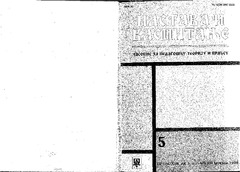Приказ основних података о документу
Effects of elementary and secondary education
Efekti osnovnog i srednjeg obrazovanja
| dc.creator | Maksić, Slavica | |
| dc.date.accessioned | 2021-03-17T13:22:58Z | |
| dc.date.available | 2021-03-17T13:22:58Z | |
| dc.date.issued | 2000 | |
| dc.identifier.issn | 0547-3330 | |
| dc.identifier.uri | http://ipir.ipisr.org.rs/handle/123456789/46 | |
| dc.description.abstract | The work rings and analyses the results of a larger number of research into the educational effect of elementary and secondary school in this country. It has been stated that the objectives set are not realised completely, sometimes not even in a satisfactory way, while the results are at times absolutely negative, Generally, knowledge is acquired on the level of reproduction, to a lesser extent on the level of apprehending (cognition), while the weakest point is the ability to apply this knowledge in practice. Furthermore, students do not develop scientific notions through teaching and school study; their school experience is associated with the experience outside school and their opinions are given in complexes. The educational role of school is significantly lesser than that of the family. The discussion follows on the possible reasons for these finds in which we analysed the problems in defining and exploring the aims and tasks of institutionalised education, as well as the weak points in the research into this realisation. It is suggested that national educational standards be defined among the wishes and possibilities, which would help not only in better analysis of the objectives set, but, in the first place, in their better realisation. | en |
| dc.description.abstract | U radu su prikazani i analizirani rezultati većeg broja istraživanja koja su ispitivala obrazovne i vaspitne efekte osnovne i srednje škole u nas. Konstatovano je da se postavljeni ciljevi ne ostvaruju u potpunosti, često ne ni u zadovoljavajućoj meri, a ponekad su nalazi sasvim nepovoljni. Uglavnom se stiču znanja na nivou reprodukcije, znatno manje na nivou razumevanja, dok je osposobljenost za primenu znanja najslabija. Šta više, kroz nastavu i školsko učenje učenici ne uspevaju da razviju naučne pojmove, već se njihovo školsko iskustvo povezuje sa iskustvom stečenim izvan škole i daje mišljenje u kompleksima. Vaspitna uloga škole je znatno manja od uloge porodice. Usledila je diskusija mogućih uzroka navedenih nalaza u kojoj su analizirani problemi u definisanju i ispitivanju ciljeva i zadataka institucionalizovanog obrazovanja i vaspitanja, kao i nedostaci istraživanja o njihovoj realizaciji. Preporučeno je da se između želja i mogućnosti odrede nacionalni obrazovni standardi koji bi pomogli, ne samo u boljem ispitivanju postavljenih ciljeva i zadataka, već i pre svega, u njihovom boljem ostvarivanju. | sr |
| dc.publisher | Beograd : Pedagoško društvo Srbije | |
| dc.publisher | Beograd : Filozofski fakultet - Institut za pedagogiju i andragogiju | |
| dc.rights | openAccess | |
| dc.rights.uri | https://creativecommons.org/licenses/by-sa/4.0/ | |
| dc.source | Nastava i vaspitanje | |
| dc.subject | education | en |
| dc.subject | evaluation | en |
| dc.subject | objectives | en |
| dc.subject | effects | en |
| dc.subject | educational standards | en |
| dc.subject | obrazovanje | sr |
| dc.subject | evaulacija | sr |
| dc.subject | standardi | sr |
| dc.subject | ciljevi | sr |
| dc.title | Effects of elementary and secondary education | en |
| dc.title | Efekti osnovnog i srednjeg obrazovanja | sr |
| dc.type | article | |
| dc.rights.license | BY-SA | |
| dc.citation.epage | 742 | |
| dc.citation.issue | 5 | |
| dc.citation.other | 49(5): 725-742 | |
| dc.citation.spage | 725 | |
| dc.citation.volume | 49 | |
| dc.identifier.fulltext | http://ipir.ipisr.org.rs/bitstream/id/1550/Efekti_osnovnog_i_srednjeg_obrazovanja_2000.pdf | |
| dc.identifier.rcub | https://hdl.handle.net/21.15107/rcub_ipir_46 | |
| dc.type.version | publishedVersion |

